
Business Desk :
Bangladesh Bank (BB) is struggling to meet the growing demand for the US dollar amid a sharp rise in post-pandemic economic activities.
The number of credit bonds or LCs for importing goods is increasing unusually. In the first nine months of the current FY 22 (July-March), traders have opened LCs worth $ 68.36 billion, up by 46.04 per cent than the same period of FY 21.
The value of the LCs stood at Tk 5.89 trillion (Tk 1 lakh crore=1 trillion) which is close to the national budget of FY 22, reports UNB.
Economists say import spending has put pressure on foreign exchange. In this situation, economic experts have suggested curbing imports.
Every day, the central bank supplies US dollars to banks to meet the huge import demand for the domestic markets. The global price hike of commodities, edible oil and fossil fuel also pushed up dollar demand as payment volume increased for the same volume of goods as earlier.
On May 5, the BB paid $2.24 billion to Asian Clearing Union (ACU) as import payment for March-April, which is the highest ever. Similarly, import of goods, raw materials and capital machinery has increased from other countries.
The banks are selling greenback at Tk 86 per dollar while it is selling over Tk 92 in the kerb market, which is the highest ever.
Dr Salehuddin Ahmed, former governor of BB, told the news agency that despite rise in dollar earning from exports and remittances, the cost of imports is higher than that.
The pressure on the US dollar has increased due to the growing demand of domestic imports, while Bangladesh is also importing to export, he said.
Besides capital machinery and raw materials, the consumer goods also have to be imported.
Salehuddin suggested taking steps to control imports by increasing domestic production specially agriculture production and there is no other way.
Experts also urged BB to enhance monitoring to check trade-based money laundering, which is also being used to send black money abroad from Bangladesh in the guise of import.
According to the central bank, the supply of dollars has decreased in the currency market compared to the demand.
In such a situation, Bangladesh Bank is selling dollars so that no bank has any problem in paying the import bills. In addition, some other policy-making steps have been taken in the last few days, including controlling the import of luxury goods.
Md. Serajul Islam, BB spokesperson and executive director said, “Bangladesh Bank is doing everything to meet the demand for dollars.”
He said the BB is selling dollars to increase supply in the currency market. At the same time, initiatives have been taken to discourage the import of luxury goods.
Besides, the government has given unlimited investment opportunities in ‘dollar bonds’ to increase the supply of dollars.
“The interest rate on these bonds for expatriates has also been reduced. This will reduce the outflow of dollars from the country in the form of interest. If the investment in this bond increases again, the dollar will enter the country,” said Serajul.
Earlier, in a circular on April 11, the BB had directed to maintain a minimum cash margin rate of 25 per cent in case of opening LC for import of non-emergency goods.
Bank officials, however, say the central bank’s cautious move to control the exchange rate of dollars is not working. The exchange rate of dollars in the interbank exchange is also increasing.
To buy cash dollars in the bank or 7kerb (open) market now people have to pay Tk 86 to Tk 92 per US dollar respectively.

